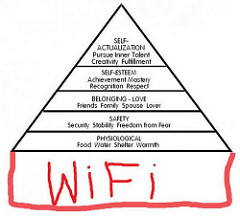Learning for understanding.
A desired goal for most learners, although I did have a student relay to me last week that he really did not want to learn why he was completing his mathematical steps. He said that understanding “The Why” was too confusing and that all he really wanted to know was what the steps were, so that he would get the correct answer.
Hmmm…. I paused for a moment to process his words.
My lessons are typically longer than my colleagues because for my own learning, “The Why” is a such a critical piece. To teach “The Why” it takes longer than simply teaching steps. It often requires activities that involve students constructing their own knowledge. “The Why” is often understood better by having peers relay the information in a simpler manner during collaboration time. “The Why” is a time suck, no question!
But this individual did not want to know “The Why”. In further conversation, it was revealed that this Grade 10 student did not realize that 5x meant 5 * x and although he was familiar with the approximation 3.14, he did not connect the number to its symbolic representation. It became very clear to me that this fifteen year old had navigated through math class for a number of years, without wanting to know “The Why”.
So I now ask myself, why and when had the system failed this individual? And if he had experienced an LfU approach to his mathematical understanding, would he now be in this precarious academic situation? Is he “a victim” of chalk and talk approaches?
The issues that non-traditional educators have with their traditional counterparts is that in these purely “chalk and talk” environments, learners do not fully construct their knowledge through direct experience (Edelson, 2000). Research also points to the merits of having students communicate with each other to not only transmit ideas but to teach students the art of social negotiation amongst each other (Radinsky, Oliva, & Alamar, 2009).
I can’t help but wonder if this student had had more opportunities to communicate his reasoning and to receive the reasoning from his peers, that he would not be harboring such negative feelings towards “The Why”.
And to diverge but a tad…
For the record, I am still an advocate of teacher-led instruction in the math and senior physics classroom. In academic math 10, it DOES matter how a solution is presented. When left to their own devices, students may very well get the answer correct, but with multiple errors in their reasoning. Notation is also important to be mindful of, as well as learning how to efficiently use a calculator. On occasion, I will have students “discover their own learning” via inquiry methodologies, but these occasions are the exception to the norm. Instead, I choose to reinforce concepts in more non-traditional ways, both with high and low technology. (I loooooove whiteboards!!)
As well, perhaps it is time that we define what “Traditional” actually means. I feel like some of us have a very strict definition of what traditional classrooms look like. Extremists will advocate that if you are not the guide on the side at all times, then you are a didactic dinosaur who should be made extinct as soon as possible. Ok… perhaps that it is an extreme impression, but honestly, telling folks in a Masters class that heavily favours Inquiry Based Learning, that you “admittedly, do direct instruction” feels like I’m in a confessional room with a priest. If “Traditional” means that the teacher is talking to a board or screen for 30 to 60 minutes, then I would not consider myself a traditionalist. However, all “direct instruction” is not considered equal, in my world. I think if I would categorize my approach to instruction, it would be direct instruction/guided inquiry methodology. My students construct bits of the instruction throughout most lessons, but I am definitely at the helm most of the time. Group work comes into play many times and I have even began to “collaboratively quiz“.
Whether or not someone chooses to demonize my teaching style, is not very consequential for me at this point anyway. I believe in what I do, and have enough positive feedback to make me want to stay on my current path of blending new approaches with tried-and-true approaches. My advice to those who wish to cast stones at others who do not fully embrace new pedagogical ways, is to lay off a bit. Focus on your own practice. Mentor those who wish to learn new techniques and embrace your inner honey pot.

Courtesy of Flickr QuotesEverlasting
References
Edelson, D.C. (2001). Learning-for-use: A framework for the design of technology-supported inquiry activities. Journal of Research in Science Teaching,38(3), 355-385.
Radinsky, J., Oliva, S., & Alamar, K. (2009). Camila, the earth, and the sun: Constructing an idea as shared intellectual property. Journal of Research in Science Teaching, 47(6), 619-642.




